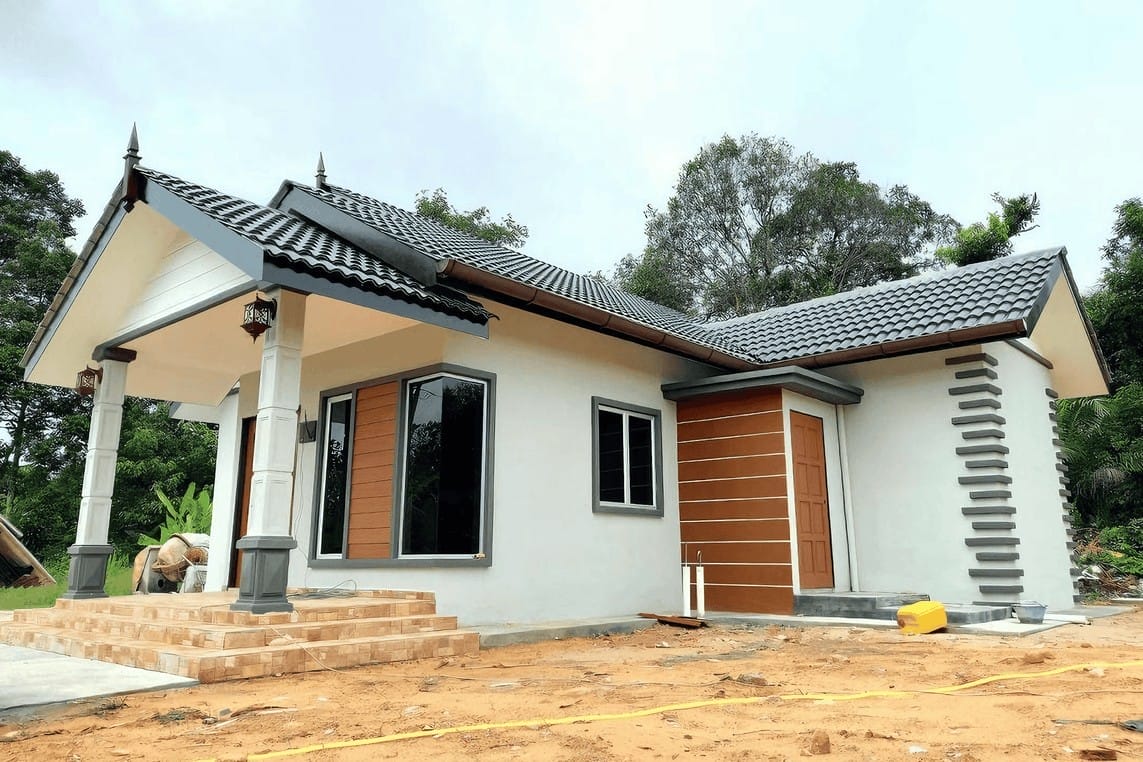
Blog
How to Become a Construction Loan Whisperer and Get the Best Deals | RumahHQ

Introduction:
So, you’ve heard about construction loans, but do you really know the ins and outs of scoring the best deals? In the bustling world of real estate, especially here in Malaysia, becoming a construction loan whisperer isn’t just a dream—it’s a skill that can save you a bundle and bring your dream projects to life. Imagine navigating through the complex jargon of lenders, understanding the fine print, and negotiating terms like a pro. Sounds good, right? Whether you’re looking to build your first home, expand your investment portfolio, or even just curious about the process, this guide is here to help you unlock those secrets. Let’s break down the steps to become the go-to guru for construction loans, and soon you’ll be sealing deals that leave your wallet smiling. Ready to dive in?
Understanding the Essentials of Construction Loans
When diving into the world of construction loans, it’s crucial to grasp the foundational concepts that differentiate them from traditional mortgages. Construction loans are typically short-term financing options specifically tailored for people looking to build or renovate a property. Unlike standard home loans, these finance the actual construction process rather than a finished structure. This dual structure often leads to two different lending processes: one during construction and another for mortgage once the property is completed.
The construction loan process is unique, and understanding key components can help you navigate it more smoothly:
- Disbursement Method: Funds are released in stages, known as “draws,” linked to construction progress.
- Interest Rates: Rates can be variable, meaning they may change during the loan period, impacting your overall cost.
- Loan Duration: Construction loans usually last for a year or less, after which you must convert to a permanent mortgage.
One of the essential strategies in becoming adept at securing favorable construction loans is doing your homework on different lenders and their offerings. Each lender will have unique terms and conditions, and being prepared can save you money and time. Here’s a quick comparison table to simplify the lender exploration process:
| Lender Type | Interest Rates | Loan Duration | Flexibility |
|---|---|---|---|
| Traditional Banks | 2.5% – 6% (Varies) | 12 months | Moderate |
| Credit Unions | 2% – 5% (Better rates) | 6 to 18 months | High |
| Specialized Lenders | 3% – 7% (Varies) | 12 months | High |

Navigating the Loan Application Process with Confidence
When it comes to obtaining a construction loan, having the right knowledge and mindset can make all the difference. First up, it’s super important to prepare your documentation. Lenders will want to see things like your personal financial statements, proof of income, and detailed plans for your construction project. Here’s a quick checklist to help you stay on track:
- Personal financial statements
- Income verification (pay stubs, tax returns)
- Project budget and timeline
- Construction plans and permits
Next, making a solid impression during the loan interview is crucial. You want to show your lender that you’re not just any applicant but someone they’ve got to trust. Make sure to articulate your vision clearly, and present any past experiences you have that add to your credibility. Consider preparing a table that outlines your construction project timeline:
| Phase | Timeframe | Key Activities |
|---|---|---|
| Planning | 1-2 Months | Design, permits, financing |
| Foundation | 2-4 Months | Excavation, pouring foundation |
| Framing | 2 Months | Structure, roofing |
| Finishing | 1-3 Months | Interior work, landscaping |
Lastly, don’t shy away from negotiating the terms of your loan. Lenders often have flexibility in terms of interest rates and fees, especially if you come across as an informed and confident borrower. Consider asking about lower rates for good credit, options for reducing fees, or even the possibility of customizing your repayment schedule. Being proactive in discussing features that suit your financial situation can lead to securing a deal that works in your favor.

The Art of Building Relationships with Lenders
Building solid relationships with lenders is like crafting a fine piece of art. It requires understanding their needs, communication skills, and a sprinkle of charm. First and foremost, get to know your local lenders. Each has their own set of offerings and borrowing criteria, so take the time to understand what sets them apart. Be proactive in reaching out, attending networking events, or even simply following their updates online. Remember, establishing rapport goes a long way in turning potential lenders into long-term partners.
Next, transparency is your secret weapon. When discussing your construction projects, share your vision clearly. Lenders appreciate a well-thought-out proposal that showcases not just numbers but also the passion behind the project. A detailed plan can include elements like timelines, budgets, and potential challenges. Keeping an open line of communication helps build trust, and trust means you’re more likely to receive favorable terms. Don’t shy away from asking questions; curiosity shows you’re engaged and serious about your project.
Lastly, consider offering something in return. Share your success stories with lenders or keep them updated on project milestones. Positive feedback loops can elevate your relationship – it’s not just about what they can do for you, but also what you can provide in return. Something as simple as a thank-you note or an invitation to project visits can create goodwill. Over time, these small gestures can lead to better rates and terms, turning you into a preferred borrower.
| Lender Strategies | Benefits |
|---|---|
| Networking | Expand connections and access exclusive deals |
| Transparency | Build trust and rapport with lenders |
| Regular Updates | Enhance relationships for future benefits |
Analyzing Market Trends to Secure Better Rates
Understanding the ebb and flow of market trends is crucial for securing the most favorable construction loan rates. By staying informed about both local and national economic indicators, you can position yourself as a savvy borrower. Key factors to monitor include:
- Interest Rate Changes: Keep an eye on central bank policies that directly influence borrowing costs.
- Housing Market Demand: High demand can push rates up, while a saturated market might lead to better deals.
- Construction Costs: Fluctuations in material costs can signal shifts in financing appetite.
To make sense of these trends, consider creating a simple table that summarizes current economic indicators, their historical data, and potential impacts on loan rates. Here’s an example:
| Indicator | Current Rate | Historical Average | Potential Impact on Loans |
|---|---|---|---|
| Bank Negara Malaysia Rate | 2.00% | 3.00% | Lower rates likely lead to reduced loan costs. |
| RM Construction Materials Index | 120 | 110 | Rising costs may tighten loan availability. |
By gathering and analyzing this data, you can not only anticipate when to act but also leverage your insights during discussions with lenders. Demonstrating your knowledge of trending market conditions influences lenders’ perceptions and might even motivate them to offer you better terms. Your goal is to not just follow the trends, but also to forecast future movements, setting yourself apart in the competitive landscape of construction financing.

Mastering Negotiation Techniques for Construction Financing
When it comes to securing financing for construction, understanding the art of negotiation can make all the difference. A few strategic techniques can empower you to navigate the waters of financial discussions with confidence. Here are some key strategies to implement:
- Do Your Homework: Before entering a meeting, research market rates, comparable projects, and lenders’ tendencies. Knowledge is power!
- Build Relationships: Establish a good rapport with your lenders. People are often more willing to work with someone they trust.
- Negotiate Beyond Rates: Don’t just focus on the interest rate; discuss terms like repayment periods and fees that can save you a lot in the long run.
Another successful tactic involves framing your requests in ways that benefit both parties. For example, if you ask for a lower interest rate, highlight how this will potentially lead to a quicker project completion which is beneficial for the lender’s ROI. Here’s a quick table that illustrates some points to emphasize during the negotiation:
| Negotiation Topic | Benefit for You | Benefit for Lender |
|---|---|---|
| Lower Interest Rate | Reduce overall costs | Increased customer satisfaction |
| Longer Repayment Period | Easier cash flow management | Lower default risk |
| Reduced Fees | Lower upfront costs | Potential for repeat business |
Lastly, be prepared for some pushback—it’s part of the negotiation dance. Instead of seeing it as a wall, turn it into an opportunity. Ask open-ended questions that encourage dialogue. Consider discussing potential compromises that keep the lender motivated while still catering to your needs. A successful negotiation isn’t just about winning; it’s about creating options that work for everyone involved.

Exploring Alternative Financing Options Beyond Traditional Loans
When you’re navigating the world of construction financing, thinking outside the box can open up a treasure trove of opportunities. Traditional loans aren’t the only way to fund your project; there are numerous alternative financing options that can give you the flexibility you need. For instance, you might consider peer-to-peer lending, where individuals lend money directly to you in exchange for a return. This option often comes with less stringent eligibility requirements than banks.
Another route worth exploring is crowdfunding. Platforms like GoFundMe or Kickstarter let you present your project to the public and garner support from people who believe in your vision. It’s not just about cash; you might find community backing that can also help spread the word about your unique construction project. There’s also the possibility of leveraging your existing assets, such as real estate equity, which allows you to tap into the value of your property to secure financing for new projects.
Don’t overlook creative partnerships, either. Collaborating with other investors can be a powerful way to pool resources and share risk. Consider creating joint ventures where everyone involved can contribute funds, skills, or services. A simple comparison table below outlines some of these alternative financing options and their key features:
| Financing Option | Key Features |
|---|---|
| Peer-to-Peer Lending | Flexible terms, lower requirements |
| Crowdfunding | Public support, possible marketing boost |
| Real Estate Equity | Utilizes existing assets, potentially lower rates |
| Joint Ventures | Shared resources, risk mitigation |

Preparing a Compelling Project Proposal for Approvals
When it comes to drafting your project proposal, the first step is to clearly define your objectives. What do you aim to achieve with this project? Outline the primary goals and specify how your proposal benefits all stakeholders involved. Remember to keep it concise but thorough. A good strategy is to use bullet points to list key objectives, making them easy to digest:
- Increase project efficiency
- Enhance cost-effectiveness
- Improve community impact
- Ensure timely completion
Next, it’s crucial to illustrate the financial viability of your project. Create a detailed budget, including estimated costs and potential income. A well-organized table can really help clarify your financial projections. Keeping this section transparent gives your audience confidence in your proposal:
| Item | Estimated Cost (RM) |
|---|---|
| Construction Materials | 100,000 |
| Labor Costs | 80,000 |
| Permits and Licenses | 20,000 |
| Contingency Fund | 15,000 |
consider adding a timeline for your project. A well-structured timeline shows that you’ve thought through the planning process. Using a visual like a Gantt chart can make your proposal stand out and allows reviewers to quickly grasp key milestones. Your timeline should include significant phases such as:
- Initial Planning & Approvals
- Site Preparation
- Construction Phase
- Final Inspections
By following these steps, you’re not only just creating a proposal but also crafting a persuasive narrative that speaks to all involved parties, ensuring your project resonates and aligns with their interests.

When diving into the world of construction loans, having the right financial tools can make all the difference in your strategy. Start by exploring financial calculators that allow you to effortlessly compute possible monthly payments, interest rates, and the overall cost of the loan. These calculators can become your best friend in budgeting and planning, enabling you to visualize the financial commitment you’re stepping into. Don’t underestimate the power of a good spreadsheet either; it can help you manage your projected expenses and monitor cash flow throughout the construction phase.
Next, consider leveraging modern lending technology. Many online soft loan platforms and apps offer tailored options for your specific situation. They often provide features like application tracking, customizable loan terms, and real-time updates. This can help you avoid unnecessary paperwork and streamline your process. Plus, always check for educational resources provided by these platforms; they can greatly enhance your understanding of different loan types and terms, putting you in a stronger negotiating position.
it’s crucial to stay updated on the latest financial trends and rates. Setting up alerts for fluctuations in interest rates or government incentives can give you an edge. Be sure to compare offers from multiple lenders, as they can vary significantly. Here’s a quick table comparing essential factors across popular financial institutions:
| Lender | Interest Rate | Fees | Customer Rating |
|---|---|---|---|
| Lender A | 3.5% | 1.0% | 4.5/5 |
| Lender B | 3.8% | 0.7% | 4.2/5 |
| Lender C | 3.2% | 1.3% | 4.7/5 |
To Wrap It Up
So there you have it! Becoming a construction loan whisperer isn’t as mysterious as it sounds. With the right knowledge, a sprinkle of patience, and a dash of negotiation finesse, you can unlock the best deals out there. Just remember to keep your ears open, your eyes sharp, and don’t be afraid to ask questions. The world of construction loans is ever-evolving, and staying informed is key.
So why not take that first step today? Dive into the resources available, chat with industry experts, and maybe even make a few connections. Who knows? You might just end up paving the way to your dream project sooner than you think. Happy financing, and may the best deals come your way!
kontraktor rumah
bina rumah
pinjaman lppsa
pengeluaran kwsp
spesifikasi rumah
rumah batu-bata
pelan rumah
rekabentuk rumah
bina rumah atas tanah sendiri
kontraktor rumah selangor
rumah banglo
Source link











